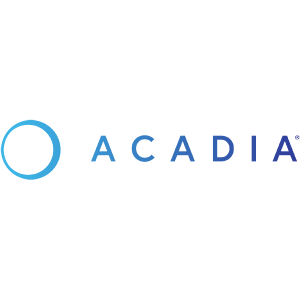Acadia Pharmaceuticals Presents New DAYBUE™ (trofinetide) Clinical Data at the 2024 American Academy of Neurology (AAN) Annual Meeting
The presentations include outcomes from the DAFFODIL™, a Phase 2/3 open-label study evaluating the safety, tolerability and exploratory efficacy of DAYBUE in girls aged two to four living with Rett syndrome, as well as findings from exit interviews with caregivers of individuals living with Rett syndrome who participated in the LAVENDER™, LILAC™, LILAC-2™ and DAFFODIL studies.
AAN Oral Presentations:
- Oral Presentation 003/Abstract 3540: Trofinetide for the Treatment of Girls Aged Two to Four Years with Rett Syndrome: Final Results from the Open-label DAFFODIL Study, Wednesday, April 17 at 3:54pm MT
- Oral Presentation 008/Abstract 2877: Assessing Experiences with Trofinetide for Rett Syndrome: Interviews with Caregivers of Patients in Open-label Studies, Wednesday, April 17 at 4:54pm MT
About Rett Syndrome
Rett syndrome is a rare, complex, neurodevelopmental disorder that may occur over four stages and affects approximately 6,000 to 9,000 patients in the
Symptoms of Rett syndrome may also include development of hand stereotypies, such as hand wringing and clapping, and gait abnormalities.8 Most Rett patients typically live into adulthood and require round-the-clock care.2,9
About DAYBUE™ (trofinetide)
Trofinetide is a synthetic analog of the N-terminal tripeptide of insulin-like growth factor 1. The mechanism by which trofinetide exerts therapeutic effects in patients with Rett syndrome is unknown. Trofinetide is thought to enhance neuronal synaptic function and morphology. This hypothesis is supported by findings from studies of trofinetide in a methyl-CpG-binding protein 2 gene (Mecp2) mouse model of Rett syndrome, in which increased branching of the dendrites that form synapses and synaptic plasticity signals were observed.10
Important Safety Information for DAYBUE™ (trofinetide)
-
Warnings and Precautions
-
Diarrhea: In a 12-week study and in long-term studies, an aggregate of
85% of patients treated with DAYBUE experienced diarrhea. In those treated with DAYBUE,49% either had persistent diarrhea or recurrence after resolution despite dose interruptions, reductions, or concomitant antidiarrheal therapy. Diarrhea severity was of mild or moderate severity in96% of cases. In the 12-week study, antidiarrheal medication was used in51% of patients treated with DAYBUE. Patients should stop taking laxatives before starting DAYBUE. If diarrhea occurs, patients should notify their healthcare provider, consider starting antidiarrheal treatment, and monitor hydration status and increase oral fluids, if needed. Interrupt, reduce dose, or discontinue DAYBUE if severe diarrhea occurs or if dehydration is suspected. -
Weight Loss: In the 12-week study,
12% of patients treated with DAYBUE experienced weight loss of greater than7% from baseline, compared to4% of patients who received placebo. In long-term studies,2.2% of patients discontinued treatment with DAYBUE due to weight loss. Monitor weight and interrupt, reduce dose, or discontinue DAYBUE if significant weight loss occurs.
-
Diarrhea: In a 12-week study and in long-term studies, an aggregate of
-
Adverse Reactions: The common adverse reactions (≥
5% for DAYBUE-treated patients and at least2% greater than in placebo) reported in the 12-week study were diarrhea (82% vs20% ), vomiting (29% vs12% ), fever (9% vs4% ), seizure (9% vs6% ), anxiety (8% vs1% ), decreased appetite (8% vs2% ), fatigue (8% vs2% ), and nasopharyngitis (5% vs1% ).
-
Drug Interactions: Effect of DAYBUE on other Drugs
- DAYBUE is a weak CYP3A4 inhibitor; therefore, plasma concentrations of CYP3A4 substrates may be increased if given concomitantly with DAYBUE. Closely monitor when DAYBUE is used in combination with orally administered CYP3A4 sensitive substrates for which a small change in substrate plasma concentration may lead to serious toxicities.
- Plasma concentrations of OATP1B1 and OATP1B3 substrates may be increased if given concomitantly with DAYBUE. Avoid the concomitant use of DAYBUE with OATP1B1 and OATP1B3 substrates for which a small change in substrate plasma concentration may lead to serious toxicities.
-
Use in Specific Population: Renal Impairment
- DAYBUE is not recommended for patients with moderate or severe renal impairment.
DAYBUE is available as an oral solution (200 mg/mL).
Please read the accompanying full Prescribing Information, also available at DAYBUE.com
About Acadia Pharmaceuticals
Acadia is advancing breakthroughs in neuroscience to elevate life. For 30 years we have been working at the forefront of healthcare to bring vital solutions to people who need them most. We developed and commercialized the first and only FDA-approved drug to treat hallucinations and delusions associated with Parkinson’s disease psychosis and the first and only FDA-approved drug for the treatment of Rett syndrome. Our clinical-stage development efforts are focused on Prader-Willi syndrome, Alzheimer’s disease psychosis and multiple other programs targeting neuropsychiatric symptoms in central nervous system disorders. For more information, visit us at Acadia.com and follow us on LinkedIn and Twitter.
References
1 Acadia Pharmaceuticals Inc., Data on file. RTT US Prevalence. March 2022.
2 Fu C, Armstrong D, Marsh E, et al. Consensus guidelines on managing Rett syndrome across the lifespan. BMJ Paediatrics Open. 2020; 4: 1-14.
3 Kyle SM, Vashi N, Justice MJ. Rett syndrome: a neurological disorder with metabolic components. Open Biol. 2018; 8: 170216.
4 Acadia Pharmaceuticals Inc., Data on file.
5 Amir RE, Van den Veyver IB, Wan M, et al. Rett syndrome is caused by mutations in X-linked MECP2, encoding methyl-CpG-binding protein 2. Nat Genet. 1999; 23(2): 185-188.
6 Fukuda T, Itoh M, Ichikawa T, et al. Delayed maturation of neuronal architecture and synaptogenesis in cerebral cortex of Mecp2-deficient mice. J Neuropathol Exp Neurol. 2005; 64(6): 537-544.
7 Asaka Y, Jugloff DG, Zhang L, et al. Hippocampal synaptic plasticity is impaired in the Mecp2-null mouse model of Rett syndrome. Neurobiol Dis. 2006; 21(1): 217-227.
8 Neul JL, Kaufmann WE, Glaze DG, et al. Rett syndrome: revised diagnostic criteria and nomenclature. Ann Neurol. 2010; 68(6): 944-950.
9 Daniel C, Tarquinio DO, Hou W, et al. The changing face of survival in Rett syndrome and MECP2-related disorders. Pediatr Neurol. 2015; 53(5): 402-411.
10 Acadia Pharmaceuticals Inc., Data on file.
View source version on businesswire.com: https://www.businesswire.com/news/home/20240417338314/en/
Investor Contact:
Acadia Pharmaceuticals Inc.
Al Kildani
(858) 261-2872
ir@acadia-pharm.com
Acadia Pharmaceuticals Inc.
Jessica Tieszen
(858) 261-2950
ir@acadia-pharm.com
Media Contact:
Acadia Pharmaceuticals Inc.
Deb Kazenelson
(818) 395-3043
media@acadia-pharm.com
Source: Acadia Pharmaceuticals Inc.







